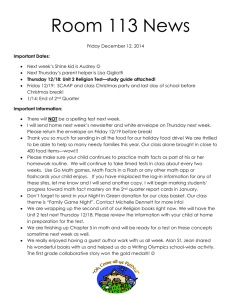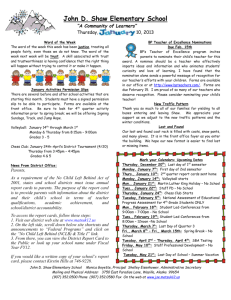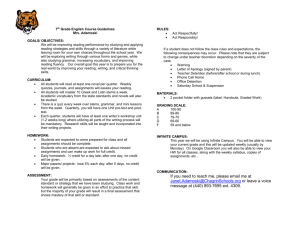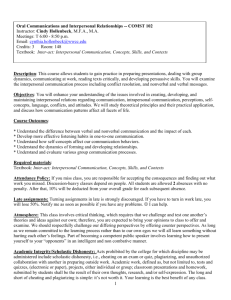bus-mhr 660 introduction to human resources management
advertisement
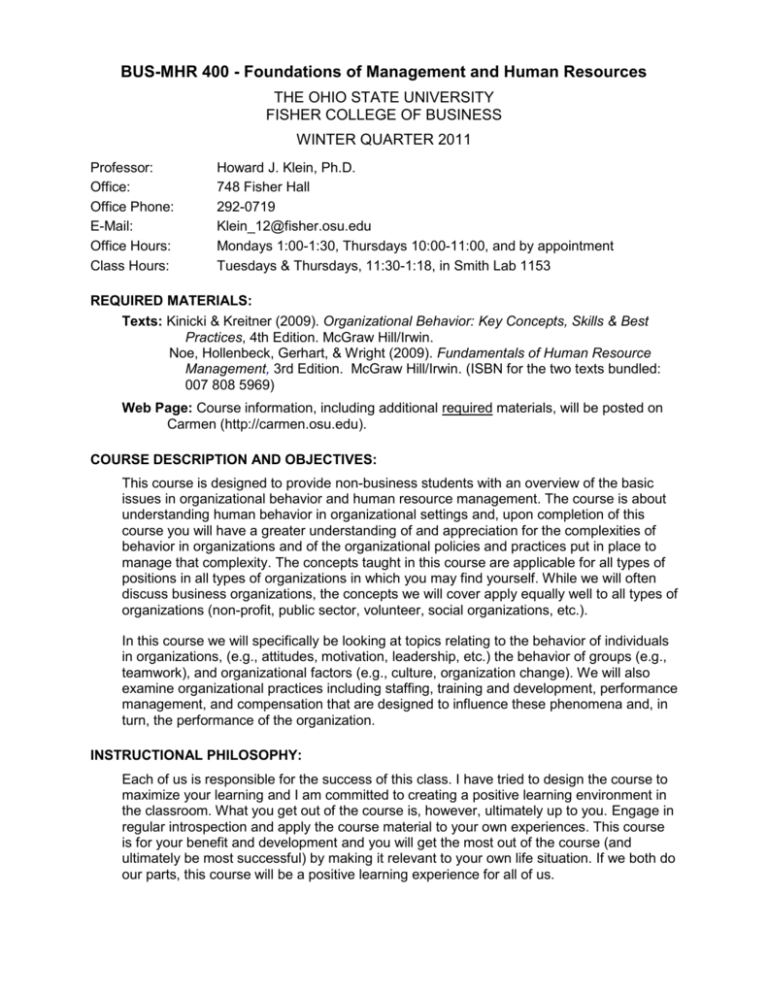
BUS-MHR 400 - Foundations of Management and Human Resources THE OHIO STATE UNIVERSITY FISHER COLLEGE OF BUSINESS WINTER QUARTER 2011 Professor: Office: Office Phone: E-Mail: Office Hours: Class Hours: Howard J. Klein, Ph.D. 748 Fisher Hall 292-0719 Klein_12@fisher.osu.edu Mondays 1:00-1:30, Thursdays 10:00-11:00, and by appointment Tuesdays & Thursdays, 11:30-1:18, in Smith Lab 1153 REQUIRED MATERIALS: Texts: Kinicki & Kreitner (2009). Organizational Behavior: Key Concepts, Skills & Best Practices, 4th Edition. McGraw Hill/Irwin. Noe, Hollenbeck, Gerhart, & Wright (2009). Fundamentals of Human Resource Management, 3rd Edition. McGraw Hill/Irwin. (ISBN for the two texts bundled: 007 808 5969) Web Page: Course information, including additional required materials, will be posted on Carmen (http://carmen.osu.edu). COURSE DESCRIPTION AND OBJECTIVES: This course is designed to provide non-business students with an overview of the basic issues in organizational behavior and human resource management. The course is about understanding human behavior in organizational settings and, upon completion of this course you will have a greater understanding of and appreciation for the complexities of behavior in organizations and of the organizational policies and practices put in place to manage that complexity. The concepts taught in this course are applicable for all types of positions in all types of organizations in which you may find yourself. While we will often discuss business organizations, the concepts we will cover apply equally well to all types of organizations (non-profit, public sector, volunteer, social organizations, etc.). In this course we will specifically be looking at topics relating to the behavior of individuals in organizations, (e.g., attitudes, motivation, leadership, etc.) the behavior of groups (e.g., teamwork), and organizational factors (e.g., culture, organization change). We will also examine organizational practices including staffing, training and development, performance management, and compensation that are designed to influence these phenomena and, in turn, the performance of the organization. INSTRUCTIONAL PHILOSOPHY: Each of us is responsible for the success of this class. I have tried to design the course to maximize your learning and I am committed to creating a positive learning environment in the classroom. What you get out of the course is, however, ultimately up to you. Engage in regular introspection and apply the course material to your own experiences. This course is for your benefit and development and you will get the most out of the course (and ultimately be most successful) by making it relevant to your own life situation. If we both do our parts, this course will be a positive learning experience for all of us. 2 MHR 400 Winter 2011 EXPECTATIONS: 1. Attendance. Regular attendance throughout the quarter is critical and appreciated (as is arriving on time). Understanding (not to mention a decent grade) will not be acquired by reliance on readings instead of class attendance nor vice versa. Furthermore, I expect you to be here when you’re here (i.e., intellectually engaged, not just physically present). 2. Preparation. Come to class having completed the assignments, review those materials prior to class, and bring your course materials with you to class. I structure the class time assuming that you have completed the assignments. Class time will be spent evaluating, integrating and supplementing the material covered in the assignments, not rehashing that material. 3. Contribution. Ask questions and contribute your thoughts and personal experiences whenever relevant (even in this large classroom). Everyone benefits from a more positive learning environment and the class becomes more interesting when students actively contribute to the discussion. Note that contributing is not the same as participating. Contributing is defined as providing comments that demonstrate knowledge and integration of course material, respectful responses to and elaboration on the comments of others, and refraining from overly long monologues or war stories. We can all learn from one another in this class! 4. Professionalism. Be respectful of each other and demonstrate a high level of courtesy and professionalism. This includes minimal side talking, no making or taking phone calls, text messaging, or reading the paper in the classroom. These behaviors are distracting and disrespectful to both me and your fellow students, and they reflect poorly on you. GRADING: Your grade in this course will be based on three exams, each worth 100 points, and 3 graded assignments, each worth 5 points, for a total of 315 possible points. There may also be an opportunity to earn extra credit by participating in a research project. A straight scale, provided below, will be used to determine final grades based on total points earned during the quarter. If warranted, upward adjustments will be made to everyone’s exam scores. Point Range Final Letter Grade Point Range Final Letter Grade 295 - 315 A 284 - 294 A- 229 - 239 C 273 - 283 B+ 218 - 228 C- 262 - 272 B 207 - 217 D+ 251 - 261 B- 196 - 206 D 240 - 250 C+ 0 - 195 E Exams. The three exams will consist of multiple choice questions. These questions are aimed at assessing your understanding of and ability to integrate and apply the basic concepts, processes, and issues covered in class and in the assignments. These exams will not be cumulative but the material covered in the first part of the quarter provides the basis for material covered during the remainder of the term. The use of all electronic devices (cell phone, PDA, etc.) during an exam is strictly forbidden. MHR 400 3 Winter 2011 GRADING (continued): Assignments. Throughout the quarter, a number of short exercises and cases will be completed in class. Four of those assignments will be collected at the end of a class period and graded (no advance notice will be given of which assignments will be collected). As noted above, only 3 assignments can be counted towards final grades. The assignment receiving the lowest grade will be dropped for those students completing all four assignments. These exercises or cases will be assigned in class for you to individually complete during class and hand in at the end of class. See the information below regarding excused absences should you be miss a class where an assignment is collected. COURSE POLICIES: Anyone needing special accommodation because of a disability or other unique circumstances should notify me as early as possible. Students with special needs are responsible for making me aware of their situation. Academic dishonesty will not be tolerated. Any suspicion of academic misconduct will be acted upon in accordance with university policy. If you believe an exam or assignment grade is incorrect, you may submit an appeal. Appeals must be in writing and must contain (a) a clear identification of what you are appealing and (b) an explanation of why you think the assigned grade was incorrect, including support for that position. Note that for multiple choice questions it is not enough to demonstrate that the answer you selected could be considered correct; it must be demonstrated that the selected answer is the best answer to the question. Appeals must be received within one week of when the work is returned to you. You will receive a written response within one week of when the appeal was received. I reserve the right to re-grade the entire assignment or exam. If you are concerned about your class performance, contact me as soon as those concerns arise. I will try to help you improve your performance in the course but you must take the initiative to do so. I am not sympathetic to students who approach me during the last week of the quarter looking for extra points. The time to accumulate points is during the quarter, not at the end of the quarter. It is inevitable in a class of this size that some students will just be a few points away from the next grade. However, the cut-off points and final grades based on those cut-offs are not negotiable. You are expected to take the exams when scheduled (see below for limited exceptions). It is your responsibility to be at the exams as scheduled, so plan accordingly. Students will not be allowed to make-up a missed exam or assignment without a documented, legitimate medical situation or family emergency). Otherwise, the failure to take an exam at the appointed time or turn in a graded assignment when collected will result in a score of 0 points for that exam or assignment. 4 MHR 400 Winter 2011 CLASS SCHEDULE & ASSIGNMENTS: K refers to the Kinicki & Kreitner text; N to the Noe et al. text. Select overheads and any additional assignments or handouts will be posted on Carmen. Assignments should be completed prior to coming to class on the day that they are assigned. Day (Date) Topic Text Assignment TUESDAY (1/4) Introduction to the course K Chapter 1 THURSDAY (1/6) Strategic HRM N Chapters 1 & 2 TUESDAY (1/11) Organizational Culture K Chapter 2 THURSDAY (1/13) Perception & Attitudes TUESDAY (1/18) Individual Differences THURSDAY (1/20) Fairness & Ethics TUESDAY (1/25) EXAM I THURSDAY (1/27) Safety & Health N pp 74-83. TUESDAY (2/1) Planning & Recruitment N pp 90-102 & Chapter 5 THURSDAY (2/3) Selection N Chapter 6 TUESDAY (2/8) Motivation I K Chapters 6; N pp 102-111 THURSDAY (2/10) Motivation II K Chapter 7, pp 118 -121, & pp 211-217 TUESDAY (2/15) Performance Management N Chapter 8 & pp 262-266; K pp 198-207 THURSDAY (2/17) EXAM II TUESDAY (2/22) Compensation & Benefits N Chapters 11-13 THURSDAY (2/24) Groups & Teams K Chapter 9 TUESDAY (3/1) Power & Leadership K Chapters 13 & 14 THURSDAY (3/3) Training & Development N Chapters 7 & 9 TUESDAY (3/8) Organizational Development K Chapter 16; N Chapter 16 THURSDAY (3/10) EXAM III K pp 84-97, 128-132, 135-138, & 159-166 K Chapter 3, pp 114-127, & 132-135 K pp 22-33 & 97-110; N pp 56-74




